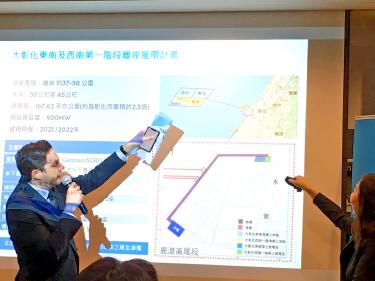Orsted A/S yesterday said it plans to establish a NT$60 million (US$1.94 million) trust fund in Taiwan, in partnership with other wind power developers, to provide local suppliers with further training and qualifications, after the Danish firm’s board made its final investment decision on Tuesday.
The trust fund would be operated by a third party, such as the Metal Industries Research and Development Center (金工中心), while the firm would also create a platform where smaller suppliers would be encouraged to engage in the local supply chain, Orsted president for Asia-Pacific Matthias Bausenwein told a news conference in Taipei.
The company said that it would further cooperate with local companies in the areas of power facilities and maritime engineering through various projects involving onshore substations, power transmission systems, maritime engineering counseling, environmental monitoring and energy storage systems.
The news came as a relief for many, as Orsted had earlier announced that it would suspend activities in Taiwan due to local supply chain complications and the Ministry of Economic Affairs’ decision to lower a feed-in tariff to NT$5.516 per kilowatt-hour.
While expressing his relief about the final investment decision, Bausenwein said that the wind power industry needs a stable framework as the company plans to operate its wind farm in Taiwan for at least 25 years.
Orsted offices would be set up in Kaohsiung and Taichung, and the number of employees would be increased to 100, Orsted said, adding that the number of direct and indirect job opportunities related to its wind farm projects in Changhua County is estimated to be 12,000.
The ministry two weeks ago approved the company’s supply chain localization solutions, and on Monday last week Orsed signed a power purchase agreement (PPA) with Taiwan Power Co (台電) concerning feed-in tariffs.
“We are nevertheless keen to amend the PPA in order to give more certainty to investors,” Bausenwein said, adding that he hopes to obtain more specifics on curtailment and risks.
Orsted would consider signing corporate PPAs, due to recent amendments to the Renewable Energy Development Act (再生能源發展條例) that make it possible to allocate renewable energy to local businesses, Bausenwein said.
The company’s southeast and southwest offshore wind farms would have a total capital expenditure of NT$165 billion, Orsted said.
The two sites are 37km to 50km off the coast of Changhua, and once completed in 2021 or 2022, they would generate 900 megawatts — enough electricity for up to 1 million Taiwanese households, the company said.
Star Energy Corp (星能) is to start onshore construction of two substations this month, creating an estimated 800 to 1,000 jobs, it said.
Orsted said that other companies, such as SinDa Marine Structure Co (興達海基), CSCB Corp, Taiwan (台灣國際造船), Formosa Heavy Industries Corp (台塑重工), China Engineering Consultants Inc (中華顧問工程), Taiwan Cogeneration Corp (台灣汽電) and Taiwan International Ports Corp (台灣港務), are already involved in the local supply chain, and the company is still in talks with Century Iron & Steel Industrial Co (世紀鋼構).
Siemens Gamesa Renewable Energy is to establish a wind turbine assembly site, the first in Asia, at the Port of Taichung, Orsted added.
The company has issued invitations to local banks for a five-year NT$25 billion revolving credit facility led by Bank Of Taiwan (台灣銀行), Cathay Union Bank (國泰世華銀行) and BNP Paribas, it added.
Source: Taipei Times - 2019/05/03





















